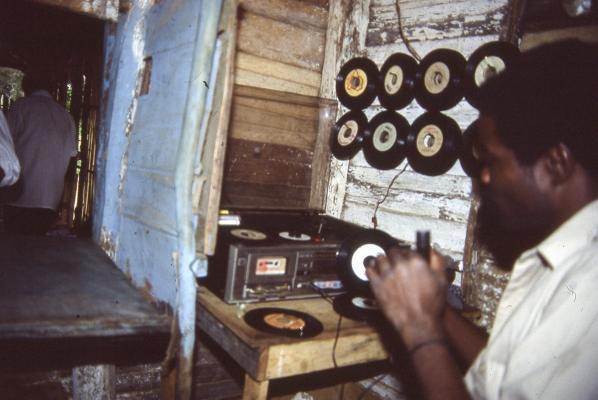The CUNY Dominican Studies Institute Library houses a significant collection of fieldwork interviews and live performances of traditional bachata from 1986 to 1994, with additional materials from 2003 to 2011.
This Dominican Bachata music and video collection includes 162 donated by cultural anthropologist Deborah Pacini Hernández to the CUNY DSI Library for the purpose of preserving and making it available to the public. Pacini Hernández created the recordings while researching for her doctoral dissertation and later while writing her book on bachata, Bachata: A Social History of Dominican Popular Music (Temple University Press, 1994).
The collection primarily consists of studio and live recordings from the mid to late 1970s and mid-1990s of traditional Dominican bachata music performed by working-class musicians in the clubs or bars of the urban areas of Santo Domingo, Dominican Republic, before the international success of bachata in the early 21st century. It also contains fieldwork interviews featuring bachata musicians, individuals from the music industry, and fans. The recordings were created in the Dominican Republic and include a range of local independent musicians that rarely traveled outside of the country, with a few exceptions performing in the United States, Latin America, and Europe. The collection is also remarkable for the depth and scope of recordings pressed in the Dominican Republic from record labels that do not exist anymore. These labels featured the music of many lesser known artists. The collection also includes a number of recordings of bachata by women. Bachata is an extremely male centered genre where song lyrics heavily reflect men’s interests and concerns. Despite their marginalization, women have long contributed to bachata, and this collection will make it possible to study women’s contributions to the genre.
Deborah Pacini Hernández’s Dominican bachata music collection will have a major impact on the scholarly study of Latino/a/x and Dominican popular music, offering opportunities to researchers to examine the historical development of Dominican music, expressed in the interviews, videos, and recordings of performance. Pacini Hernández’s book was groundbreaking as the first scholarly study of bachata, a guitar-based dance music from the Dominican Republic that draws from earlier styles like son and bolero. Since the 1960s, bachata was relegated to the margins of Dominican society until it achieved international popularity, topping charts in the United States and across the world, and recognized in 2019 as a UNESCO Intangible Cultural Heritage of Humanity.
Last Updated: 07/24/2024 15:05
